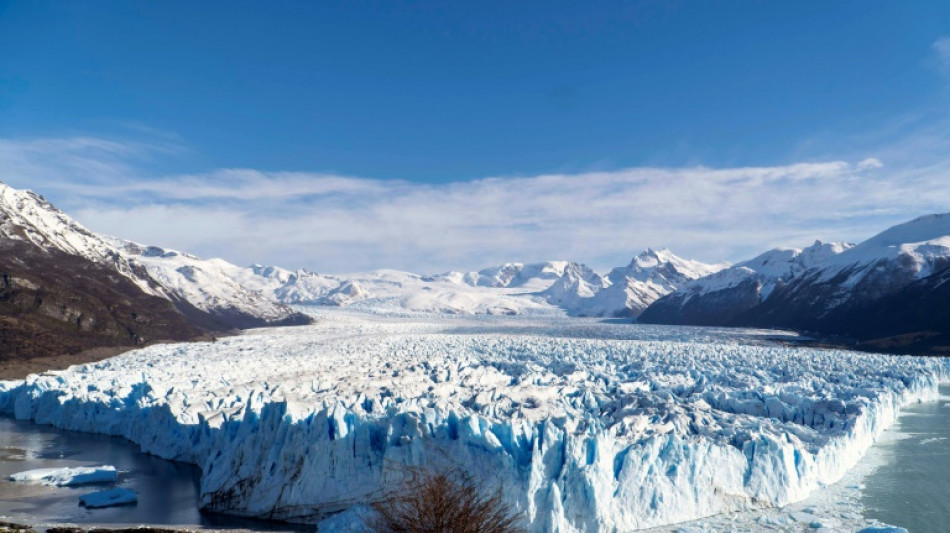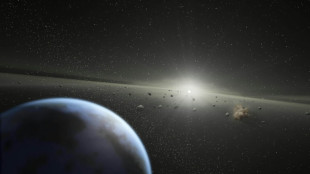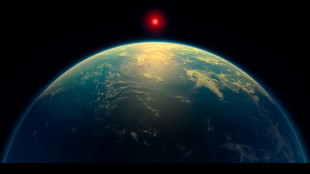
-
 Migrant's expulsion puts Washington Salvadorans on edge
Migrant's expulsion puts Washington Salvadorans on edge
-
Plan for expanded Muslim community triggers hope, fear in Texas

-
 Pakistan foreign minister due in Kabul as deportations rise
Pakistan foreign minister due in Kabul as deportations rise
-
White House touts Covid-19 'lab leak' theory on revamped site

-
 Dodgers star Ohtani skips trip to Texas to await birth of first child
Dodgers star Ohtani skips trip to Texas to await birth of first child
-
US senator says El Salvador staged 'margarita' photo op

-
 Ford 'adjusts' some exports to China due to tariffs
Ford 'adjusts' some exports to China due to tariffs
-
Thomas maintains two-shot lead at RBC Heritage

-
 US to withdraw some 1,000 troops from Syria
US to withdraw some 1,000 troops from Syria
-
Four killed after spring storms wreak havoc in the Alps

-
 Spurs' Popovich reportedly home and well after 'medical incident'
Spurs' Popovich reportedly home and well after 'medical incident'
-
Trump goes to war with the Fed

-
 Celtics chase second straight NBA title in playoff field led by Thunder, Cavs
Celtics chase second straight NBA title in playoff field led by Thunder, Cavs
-
White House site blames China for Covid-19 'lab leak'

-
 Norris edges Piastri as McLaren top Jeddah practice
Norris edges Piastri as McLaren top Jeddah practice
-
Trump warns US could ditch Ukraine talks if no progress

-
 Judge denies Sean 'Diddy' Combs push to delay trial
Judge denies Sean 'Diddy' Combs push to delay trial
-
80 killed in deadliest US attack on Yemen, Huthis say

-
 Lebanon says two killed in Israeli strikes in south
Lebanon says two killed in Israeli strikes in south
-
Trump says US will soon 'take a pass' if no Ukraine deal

-
 F1 success is 'like cooking' - Ferrari head chef Vasseur
F1 success is 'like cooking' - Ferrari head chef Vasseur
-
Cycling mulls slowing bikes to make road racing safer

-
 Macron invites foreign researchers to 'choose France'
Macron invites foreign researchers to 'choose France'
-
Klopp 'happy' in new job despite Real Madrid rumours: agent

-
 Alcaraz into Barcelona semis as defending champion Ruud exits
Alcaraz into Barcelona semis as defending champion Ruud exits
-
Vance meets Italy's Meloni before Easter at the Vatican

-
 Evenepoel returns with victory in Brabantse Pijl
Evenepoel returns with victory in Brabantse Pijl
-
Maresca confident he will survive Chelsea slump

-
 Mob beats to death man from persecuted Pakistan minority
Mob beats to death man from persecuted Pakistan minority
-
Lebanon says one killed in Israeli strike near Sidon

-
 Arsenal's Havertz could return for Champions League final
Arsenal's Havertz could return for Champions League final
-
US officials split on Ukraine truce prospects

-
 Client brain-dead after Paris cryotherapy session goes wrong
Client brain-dead after Paris cryotherapy session goes wrong
-
Flick demands answers from La Liga for 'joke' schedule

-
 'Maddest game' sums up Man Utd career for Maguire
'Maddest game' sums up Man Utd career for Maguire
-
Trial opens for students, journalists over Istanbul protests

-
 Gaza rescuers say Israeli strikes kill 24 after Hamas rejects truce proposal
Gaza rescuers say Israeli strikes kill 24 after Hamas rejects truce proposal
-
'Really stuck': Ukraine's EU accession drive stumbles

-
 'Not the time to discuss future', says Alonso amid Real Madrid links
'Not the time to discuss future', says Alonso amid Real Madrid links
-
74 killed in deadliest US attack on Yemen, Huthis say

-
 Southgate's ex-assistant Holland fired by Japan's Yokohama
Southgate's ex-assistant Holland fired by Japan's Yokohama
-
Vance meets Meloni in Rome before Easter at the Vatican

-
 Ryan Gosling to star in new 'Star Wars' film
Ryan Gosling to star in new 'Star Wars' film
-
Hamas calls for pressure to end Israel's aid block on Gaza

-
 Russia says Ukraine energy truce over, US mulls peace talks exit
Russia says Ukraine energy truce over, US mulls peace talks exit
-
58 killed in deadliest US strike on Yemen, Huthis say

-
 Museums rethink how the Holocaust should be shown
Museums rethink how the Holocaust should be shown
-
Three dead after deadly spring storm wreaks havoc in the Alps

-
 No need for big changes at Liverpool, says Slot
No need for big changes at Liverpool, says Slot
-
Bloody Philippine passion play sees final performance of veteran 'Jesus'


Study reveals how Earth's orbit controls ice ages
The Earth's next ice age is expected to begin in about 11,000 years -- unless human-caused global warming disrupts natural cycles.
That's according to a new study published Thursday in Science, which analyzed how subtle shifts in Earth's orbit around the Sun have historically triggered massive climate changes.
A research team examined a million-year record of climate change, focusing on land-based ice sheets across the Northern Hemisphere and deep ocean temperatures.
They then paired this data with small but cyclical variations in Earth's orbital patterns.
"For many years, the difficulty in answering how small changes in Earth's orbit around the Sun translate to large shifts between glacial and interglacial states has been a central theme in paleoclimate research," lead author Stephen Barker, a professor at Cardiff University, told AFP.
Earth has long alternated between ice ages and warmer interglacial periods, with the last glaciation ending approximately 11,700 years ago. This transition marked the beginning of the Holocene epoch, an era of relative climate stability that enabled early human societies to shift from nomadic hunting and gathering to settled agriculture.
Scientists have long recognized a connection between Earth's orbit and ice ages. However, due to challenges in accurately dating climate changes that occurred so far in the past, they struggled to pinpoint which orbital parameters were responsible for starting and ending these glacial cycles.
According to Barker, the key breakthrough came from analyzing the "shape" of the ancient climate record -- the curves showing how temperatures rose and fell over time -- rather than just the timing of ice age transitions.
This approach allowed the team to determine how the three orbital factors -- tilt, wobble, and the shape of Earth's orbit around the Sun -- interact to drive ice age cycles over the past 900,000 years.
Barker said that without the Industrial Revolution, assuming fossil fuels had never been burned, "we would expect a glaciation to occur within the next 11,000 years, and it would end in 66,000 years' time."
Co-author Lorraine Lisiecki, a professor at the University of California, Santa Barbara, emphasized the significance of the study, stating that it "confirms the natural climate change cycles we observe on Earth over tens of thousands of years are largely predictable and not random or chaotic."
However, Barker strongly cautioned against interpreting the findings to suggest that human-caused climate change is beneficial.
Carbon dioxide levels have nearly doubled since the Industrial Revolution, and if emissions remain unchecked, "then in around 8,000 years' time, Antarctica would have melted, leading to around 70 meters of sea-level rise," said Barker.
"Instead of there being glaciers, you'll be underwater," he warned.
Looking ahead, the research team aims to expand on their findings by investigating the long-term impact of human-driven climate change and how it may reshape the planet's natural climate cycles.
I.Stoeckli--VB



